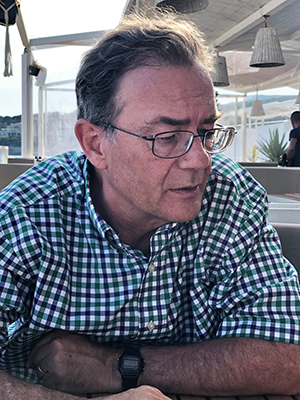Michael Bess discusses how historians can avoid realist ideology to better predict the future

Written by Madelyn Neal, CAS communications intern

Michael Bess
On September 26, the Department of German, Russian, Asian and Middle Eastern Languages and Culture (GRAMELAC) sponsored a lecture, "Why So Many People (Including Me) Failed to Foresee the Revolutions of 1989," by historian Michael Bess. He discussed how most scholars proved unable to predict the key events related to the collapse of communism in Eastern Europe and the Soviet Union.
Bess, Chancellor's Professor of History and professor of European studies at Vanderbilt University, focused his talk on the year 1989, when the Berlin Wall came down and the Soviet Union was facing tumultuous changes to its power structure. He highlighted the importance of humility and for historians to move away from analyzing international relations solely via the realist school of thought.
Bess began by setting the scene in the USSR in 1985. Gorbachev has just been elected as General Secretary, much to the shock of all those who had known and feared the Soviet Union. No one suspected Gorbachev's reformist ideology to make any difference, however it was only 4 years later that, as Bess described it, a "fortress facade that was set in stone began to melt away."
"Unlike previous political leaders that spewed Orwellian double speech, Gorbachev was genuine, and he initiated new forces of change that were so strong he couldn't control them either," Bess said.
Ultimately, set on the backdrop of openness and transparency, Bess went on, the world watched as "the totalitarian political system imploded on itself and the formidable military superpower swiftly fell apart."
But why did no historians foresee this change? Bess claimed it was because of the dominance of so-called realism in the field of international studies that most had adopted when it came to the USSR.
Realistic Pessimism as its Own Downfall

A crowd of West German citizens gathers at the newly created opening in the Berlin Wall at Potsdamer Platz. Credit: U.S. Dept. of Defense
The realist ideology dates back to pre-Machiavellian times, and it is based on the idea that people are selfish and that competition for resources are ruthlessly continual. According to Bess, no one would have predicted the deeply reformative policies set in motion by Gorbachev out of fear of appearing unrealistic and denying the accepted accuracy of the dog-eat-dog mentality.
"The strong will take what they can while the weak yield," Bess said, "and regardless of the fact that this is a hard-nosed approach, this brutality is innate in human beings."
But as a historian, Bess argued for an analytical lens that is more hopeful, more based on humans' ability to change and adapt.
"If you read newspaper headlines, you see where realist ideas come from; all news is actually bad news, [full of] winners and losers, war, death, and crime," he said. "Yet, the good news you never hear about is actually what built empires out of scattered tribes. It's what allowed the human species to dominate all others on the planet."
Bess said that ultimately, we do not live in a dog-eat-dog society, but in a pack of dogs that can come together to enact common goals.
This is why, according to Bess, he and his fellow historians could not predict the changes that took place in 1989.
"If historians were so wrong about the radical and transformative processes of the 1989 revolution, what else were they wrong about?" he said. This question became the basis for his book Our Grandchildren Redesigned.
Predicting the Future?
By examining hundreds of potential scenarios throughout history, Bess has been investigating ways in which historians can perhaps predict the future in order to avoid the total shock of the Revolutions of 1989.
"History is a tapestry woven from continuities and change," he said. "Both are fundamental to the flow of events. Change takes place on a background of continuity, but this change is both constant, cumulative, and sometimes, very profound."
Suggesting that "not all historical events are equally unpredictable," Bess discussed his examination of long (50+ years away), short (20-50 years away), and conjunctural (1-5 years away) structural processes to make educated guesses on how society will react to these changes, hundreds of years from now.
This new method of exploring the future is far from foolproof, but Bess highlighted the importance that preparation has in the event that these educated guesses prove true.
"This makes us take a salutatory look at our priorities," he said. "Which values do we want to see remain [in society] hundreds of years from now? And what do we need to do today to make sure they remain in the future?"
Ultimately, Bess concluded by emphasizing the importance of humility to future historians.
"We don't know much," he said. "The older I get, the more I'm convinced of this; we get it wrong more often than not…But maybe if we adopt a more humble stance we will misread history a bit less frequently…and I think that is as much as we can hope for."
In addition to GRAMELAC, this event was made possible with the generous support from the Havighurst Center for Russian and Post-Soviet Studies, the Humanities Center, the Department of History, and the Department of Global and Intercultural Studies.

